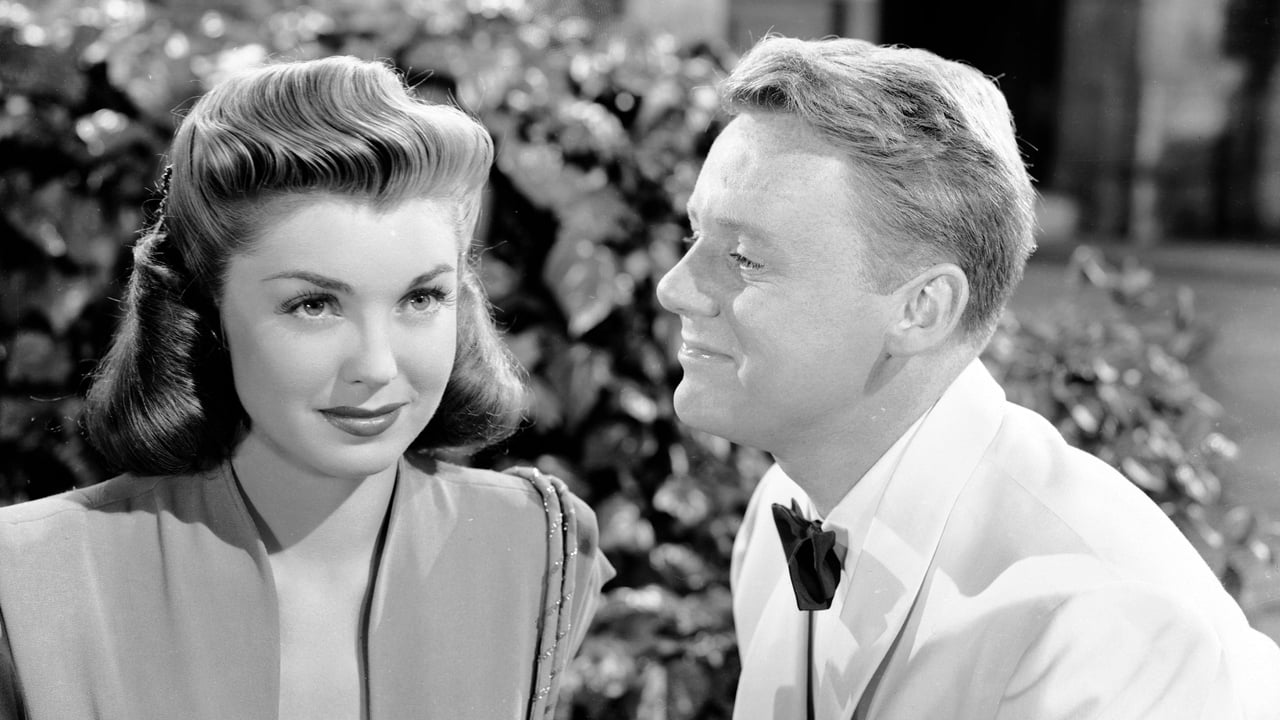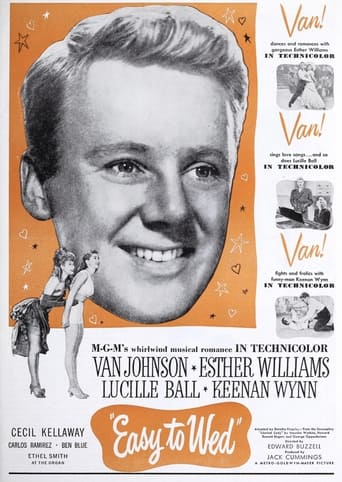Stometer
Save your money for something good and enjoyable
Afouotos
Although it has its amusing moments, in eneral the plot does not convince.
FuzzyTagz
If the ambition is to provide two hours of instantly forgettable, popcorn-munching escapism, it succeeds.
Quiet Muffin
This movie tries so hard to be funny, yet it falls flat every time. Just another example of recycled ideas repackaged with women in an attempt to appeal to a certain audience.
moonspinner55
Nonsensical remake of 1936's "Libeled Lady" casts Esther Williams as a beautiful but arrogant heiress who sues a publication for two million dollars after they print a would-be scandalous story. The newspaper gets revenge by matching the socialite up with a suave womanizer--not expecting true love to blossom. Tepid shenanigans does get Williams into the water, albeit briefly; much of this comedy is spent on fast-talking wisecracks delivered at a high decibel level. Unfortunately, louder doesn't equal funnier, and some good players flounder (particularly titian-haired Lucille Ball, in one of her weakest performances). Organist Ethel Smith has a fun bit (joined by a Spanish-singing Williams and Van Johnson!), and the film is certainly well-dressed, but the comedic timing is unpolished and the plot is insufferable. ** from ****
bkoganbing
The film Easy To Wed had an impossible task to follow the film and stars of one of the best screen comedies ever made Libeled Lady. I would take nothing away from Van Johnson, Esther Williams, Lucille Ball, and Keenan Wynn. But frankly they're all not a patch on the quartet of William Powell, Myrna Loy, Jean Harlow, and Spencer Tracy. Music and MGM technicolor is what distinguishes this film and the music primarily Latin in origin is pretty good and comes from a variety of sources. Colombian singer Carlos Ramirez contributes a native song and Ethel Smith plays her famous Tico Tico on the organ. Part of the film is set in Mexico so these acts are brought in without any strain on the plot. When the stars do their numbers, the results are pretty tepid.Esther Williams stays fairly dry in Easy To Wed. Only a dip on a water slide and a brief swim in the family pool where she unplugs a rubber raft and sends Van Johnson into the water are all you see of her. No classic water ballets in Easy To Wed which must have disappointed her fans tremendously.In Libeled Lady the character Loy/Williams's father is played by Walter Connolly and he's an avid fisherman. Here he's a hunter and Van Johnson has to take a crash course in duck hunting to make an impression on father Cecil Kellaway. Van's best moments like William Powell's in the first film are in the hunting scenes. The basic outline of the story remains the same. A false story about heiress Esther Williams's romantic escapades has caused a lawsuit to be filed by Cecil Kellaway. Editor Keenan Wynn postpones for the umpteenth time his wedding to Lucille Ball to meet the crisis at the paper. Wynn's plan, to hire back his ace reporter Van Johnson and marry his girl friend Ball to Johnson and then have Johnson strike something up with Williams. Just as Jean Harlow did, Lucille Ball amazingly enough goes along with this madcap scheme. Everybody performs well, but after you've seen Libeled Lady you will think of Easy To Wed as a road company version of that classic.
tjonasgreen
As the other comments here indicate, it's highly instructive to compare LIBELED LADY to this remake, EASY TO WED. A decade brought a huge difference in style between the Thalberg-approved slangy courtship of slapstick repartee and the plush, earnest romance of Louis B. Mayer's MGM of the '40s.Lucille Ball steals this picture with a very well-judged comic performance, aided by director Edward Buzzell, who clearly throws many scenes her way. What will surprise those who know her primarily from "I Love Lucy" is to see how much of her comic shtick is already on view here, completely developed and intact. The drunk scene, the little voices, the 'takes,' stares, reactions and expressions are familiar in every way as Lucy Ricardo. Ball also never looked more beautiful than in this film, with her hair as metallic and bright as a new penny, and in a series of witty and gorgeous costumes by Irene, who does just as well by Esther Williams.But those who are critical of Ball's performance, particularly in contrast to Jean Harlow's in LIBELED LADY, are right. Harlow was a natural, a wonderful, winning and unique personality, whose blustering scenes of anger were always justified, always expressing her common sense and dignity. The dirty little secret about why Lucille Ball never made it as a movie star was that despite her professionalism and beauty, she was essentially a strident and cold personality. What Harlow did naturally, Ball works very hard to achieve so that we admire her pyrotechnics without ever warming up to her. By the time of "I Love Lucy" she had begun to disguise her intensity with clutziness and feigned vulnerability and stupidity. And like Katharine Hepburn, she learned that if Lucy was reined-in by a man once in a while, audiences could forgive her for her aggressiveness.There is relatively little of Esther Williams' swimming in this picture. At this mid-'40s point, MGM was pushing her versatility to see just how much she could do, how far she could go. I happen to think that her screen presence (even when out of the water) is underrated. She had a refreshing, no-nonsense self confidence that is very American, and she was sexy in a way that is never blatant. The fact that this statuesque beauty with her strong physical presence and perfect carriage never acts seductively or coyly creates an unexpected sexual tension, especially in her early films (she lost a bit of it later as her body became thicker and more athletic). You can see how some would feel moved to ruffle her composure, warm her up, 'get' to her in some way, because she seems oblivious to her femininity while brimming over with it. Which is what makes her seem an emblematic American movie star. In the first half of this picture she gives a good account of the kind of frigid glamor girl that Alexis Smith often played at Warners.' When she finally melts, it's lovely, though she is better photographed in both THRILL OF A ROMANCE and THIS TIME FOR KEEPS (where she rates closeups by Karl Freund that make her look almost impossibly, lustrously beautiful).A word about MGM's '40s Technicolor -- I love it. Many films from this period as screened on TCM seem to have been saved, restored, remastered for video tapes and DVDs. All of Esther Williams' color films from the mid-'40s are a visual treat with bright, deeply saturated color and sharp images, though a few scenes in EASY TO WED seem unaccountably muddy and soft, with desaturated color. And in one scene Ball wears a frosty blue costume that we have been told is green. Maybe they should take a look at this print before they put this film out on DVD.
sobaok
This film has its plusses -- Esthers swimming, her swimming, and her swimming. It's also in technicolor, which is always a treat to the eye. It really surprised me that a socco screenplay that made 1936's Libled Lady such a rip-roaring funny film could go so flat 10 years later. Of course Myrna Loy, Jean Harlow, William Powell, and Spencer Tracy were more highly skilled performers than this cast. Williams has some to the stoic, amused calm that Loy had and she does okay as Connie, but Lucille Ball is almost unfunny in this, which really surprised me. She lacks Harlows warmth and vulnerability and timing. Harlow really carried Libled Lady and one always looks forward to her scenes. Ball is too arch and steely here. It puts a damper on the films success.

